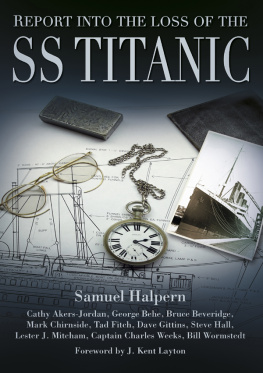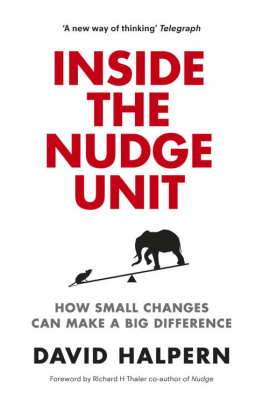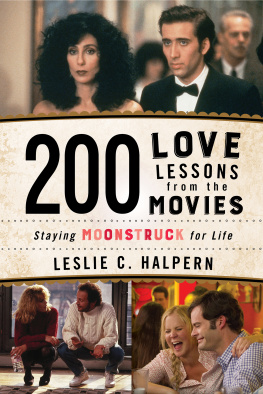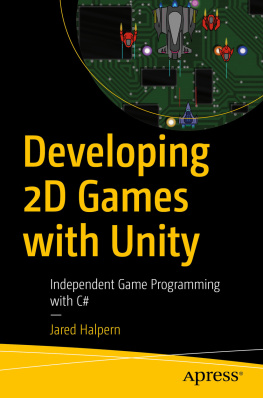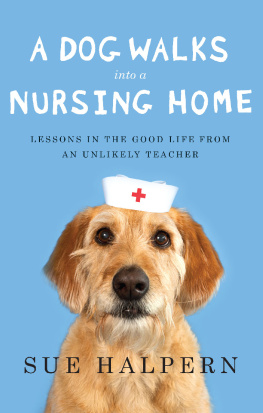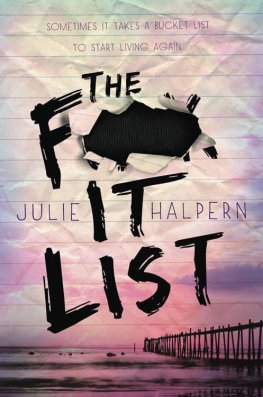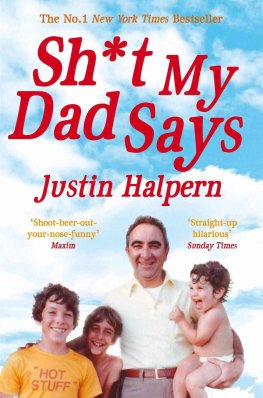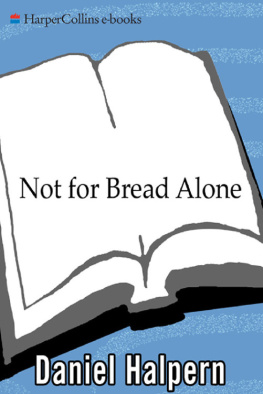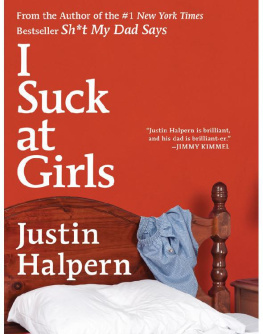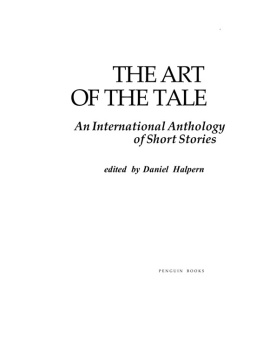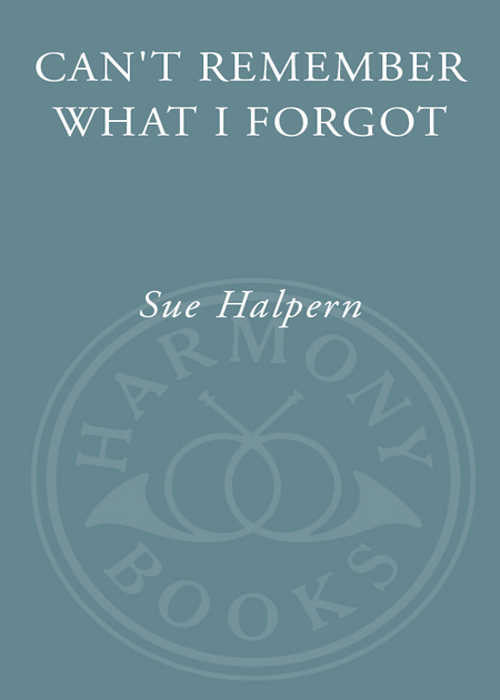
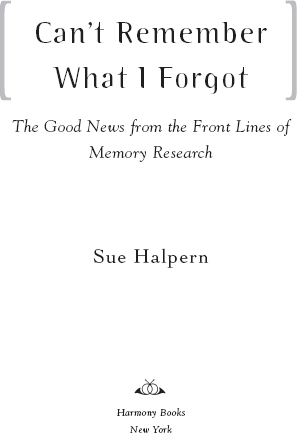
Contents
For Barbara Epstein
no forgetski

Authors Note
ON THE CANTED CEILING above my desk is a map of the brain. It shows the frontal lobe and temporal lobe and parietal lobe and occipital lobe as if they were places to visitRome, Milan, Trieste, San Remo. The map, of course, is dumb. It says nothing about what goes on in those places: that deep in the middle of the temporal lobe, which itself is deep in the middle of the brain, there is a tiny, cashew-shaped region called the hippocampus that is essential to forming new memories, or that the prefrontal cortex, which sits behind the eyebrows, is vital to foresight and being polite and paying attention, or that the occipital lobe, which brings up the rear of the brain, is central to sight itself.
I look at that map sometimes and think about how it is my own brain apprehending it, and that to do so, it is traveling express. And then my mind, declaring its independence from my brain, begins to wander among the events of the day, past and future, and plans for summer vacation, and concern for a friend who is sick and the dog in the yard, but never getting so far afield that it doesnt heed its own call back.
Near the map, tacked to the wall, is a picture of the brain that is doing all of that and all of thisthis writing, thinking, typing, seeingmy brain, in bright colors, which was taken a few years ago in California. When I look at that picture I am not only seeing it, but recalling that day, or aspects of it, so much has gone out with the tide. I took notes on that trip, and carried a digital recorder, and have read and reread those notes over the years, and listened to the conversations, so I remember that day better than most, and what I remember comes with a certain confidence, but even so it is fuzzy. I cannot say, for instance, what kind of rental car I drove, or what book I was reading later that afternoon when I went to the beach, or which beach, specifically, it was.
We rely on memory not only to remember, but to walk and dream and talk and smell and plan and fear and love and think and learn and more and more and more. Memory is how we know the worldthat is a tree, this is a sentenceand know ourselvesI like chocolate ice cream, I am a singerand know ourselves in the world. Amnesiacs make the case well: it is not, simply, that they dont remember their name or where they live, it is that absent memory, they are strangers to themselves. The English philosopher John Locke believed that we came into the world with our mind a blank slate, a tabula rasa, ready for the pen of experience to inscribe. Its a perfect metaphor (even if its not exactly true), because it works to describe what its like to gain knowledge, and what its like to lose your mind. Stroke by uneven stroke, the eraser plies the board.
My father, before he died at the age of seventy-seven, had begun to know this intimately, though never to the extent that the board was wiped so clean that he approached Lockes natal state. He knew, and he talked about itabout how frustrating it was to read the newspaper and then have to read it again, or to stare at a can opener, not knowing what it was for, or to pick up the phone to call a friend, whose funeral hed attended two years earlier.
While it might have been natural for me to worry that my fathers fate someday would be my own, I didnt, really. The doctor said he didnt have Alzheimers disease, and since Alzheimers disease tends to run in families, I figured I was safe. This was not one of those calculate-your-odds kind of conclusions. It wasnt a calculation at all. At best it was a passing thought. Call it denial, call it repression, or maybe arrogance, I just figured that if he didnt have AD, what was it to me?
But later, after he was gone, and all that was left were my memories, some photos, and the key-chain recorder my mother made him carry like a pair of military dog tags at the end in case he got lost, into which he spoke his name, his phone number, and his street address in the flattest of voices, I began to wonder. What if the doctor had been wrong? Almost everyone I knew had a parent or an in-law or a favorite aunt or a colleague or a neighbor or a grandfather or a friend or a friend of a friend who had Alzheimers, as if the standard six degrees of separation had been universally abridged to one or two. But another question bothered me more: what if the doctor had been right? What I mean is: what if my father hadnt been sick?
This was not a wishful fantasy about what my fathers last years would have been like if, when going to the basement to sort the recycling, he didnt lose track of which items went in which bin and stood there, paralyzed by confusion, for half an hour, or if he hadnt thought hed filed his income tax when he hadnt. He knew who his children were. He remained interested in politics. He had never needed to activate the key-chain recorder. The question, rather, was a kind of private, one-person, one-vote referendum on sickness and health: if he wasnt sick, what was going on?
Since it is the nature of questions to beget more questions before they yield answers, I soon stopped thinking about my father, specifically, or about myself, even when I wondered why, for instance, the memory of a forty-four-year-old was generally better than the memory of a seventy-seven-year-old (or was it?), and why the memory of a twenty-six-year-old was better than both. The answer to this was not as obvious as it might appear. If age were the culprit, what, precisely, was it stealing?
In the popular literature I kept coming across references to the brain that made it sound like a muscle. Use it or lose it was the standard dogma. I read countless self-help books that promised to help their readers use it, and compiled a stack of newspaper articles that touted crossword puzzles and sudokus as the mental equivalents of jogging and strength-training, and the more of these I looked at, the more curious it all seemed to me: I understood that these activities were supposed to be good for you because, apparently, they built mental muscle, but why was that? Was there a physiological response to crossword puzzles, something that happened to the body by doing them, and just whom did they help? Anyone of any age? People with mild memory problems? The worried well? People who were sick? And if they were beneficial for people who were sick as well as people who were not, was that because the same thing was going wrong in the healthy brains that had already gone awry in pathological ones?
The questions piled up in my notebook, a sign, perhaps, that I was using my brain, but to what end? Books evolve idiosyncratically, their single law of natural selection being, it seems, that they choose you. I began calling up neuroscientists and spending time with doctors and sometimes their patients. They were in New York, New Haven, San Francisco, Minnesota, Massachusetts, Chicago, Los Angeles, and Irvine. They were in England and the Dominican Republic and Canada and Italy and Iceland. To friends or acquaintances who, upon hearing what I was doing, told me their particular memory complaint or expressed a more generalized worry, I could tell them how many smart and committed people were out there looking for genes and molecules, developing drugs and vaccines, searching out cures and therapies in plants and minerals already at hand. These bench scientists and clinicians were making headway. Moores lawthe one about the speed of microprocessors doubling every eighteen monthsdidnt quite apply, but there was progress being made and I was seeing it. (I was also seeing rogues and patent medicine salesmen, but doesnt every court have its jesters?)
Next page

